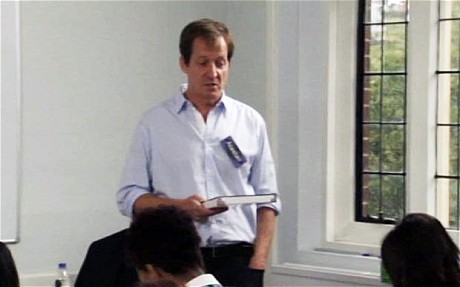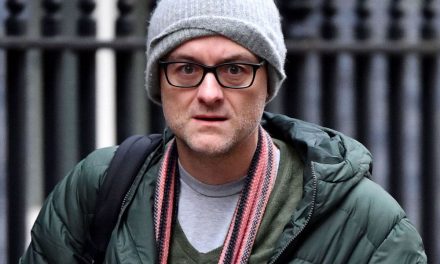David Miliband said yesterday that foreign governments, and opposition parties, found it odd in the extreme that Britain’s Conservatives were actively campaigning against Tony Blair becoming the first ‘President of Europe’.
However TB may be seen at home, where he divides opinion strongly, among the political classes in most countries he is seen as a winner, and as someone capable of managing and delivering change, and communicating the process of change well.
It has been noticeable, for example, how much the new Japanese government, formed by the Democratic Party of Japan, has been studying the Blair government as they make the transition from Opposition to a first term in power, committed to a major programme of reform.
As someone who worked closely with TB over some years, I have found myself in the unexpected position of being much in demand by the Japanese media, and print below an interview which has just appeared in the Nikkei [Nihon Keizai Shimbum], their Financial Times equivalent. The Mr Ozawa referred to is DPJ Secretary General Ichiro Ozawa, who I saw when he visited London recently to study our system of government, and in particular to examine how we went about managing change.
1. How important is the role of communications in modern politics?
The development of the media age means anyone constantly being defined in the public eye has to be strategic in their communications. Communications strategy cannot be devised wholly separately from policy development and implementation, but must be a consideration throughout.
2.The Blair government was popular but at the same time criticized as a populist regime with spin doctors. How do you view these criticisms?
With a mixture of annoyance, scepticism and indifference, and some recognition that we were too slow to see how the issue of spin was developing as a problem. That being said, the real spin doctors in Britain are the journalists, owners and editors with an agenda, reporters paid to follow that agenda, and a culture of negativity designed to paint politics in a bad light. We had a fair media wind in the early days but that quickly changed and I think it is to the government’s great credit that despite the culture of media negativity we achieved a great deal and maintained sufficient popular support to win three successive general elections.
3. With the Labour party seen as losing its support how can the government revitalize itself?
By defending our record properly, by attacking our opponents better and by showing that on matters of substance and policy, we have better ideas than our opponents. This has the merit of truth. The Conservatives are trying to make the election about presentation not policy.
4. There seems to be fewer differences between Labour and the Conservative party than ever before. How do you see the future of the two party system in the UK?
There are enormous differences, not least in the different approaches to the economy, public services, welfare, the constitution. There are immense differences on Europe. It is true the scale of difference is perhaps less than when Europe’s politics was defined by a battle to the death between capitalism and comminism, which ended with the collapse of the Berlin Wall. But there remain big differences.
5.In your meeting with Mr. Ozawa, you emphasized the importance of “speed” in implementing policies promised during the campaign. Why is this? How long does it take till the public loses interest in the new government?
The public will always be fairly interested in what the government is doing. The point I made is that momentum is important. Some of the most significant policy changes we made were early after our first win in 97 – bank of England independence, devolution, the minimum wage, the new deal on jobs. Also Tony Blair decided early on to make peace in Northern Ireland a priority. We established some clear strategic themes early on and then tried to work to those priorities. Perhaps we could have done even more earlier on.
6. How does a new government prioritize its new policies? Where should the focus be?
It should be on the key promises made to get there. For us that meant showing we could be trusted on the economy, public services, introducing promises made on changes to the Constitution, and a new approach in Europe. Setting priorities and making sure they are understood is a key aspect of leadership.
7.What kind of publicity strategy did you advise? What must they avoid?
I emphasised that Japan’s political and media culture is different, but that the golden rule of communications for me is to be clear about objectives, work first on the strategy to meet them, and only then think about all the tactical considerations.
8.What was Mr. Ozawa interested in? What kind of questions did he ask? How did you answer them?
He and his team wanted to know how we made the transition from opposition to government. They were very interested in practicalities, not least of how to manage the permanent civil service. I tried as best I could to explain what we did and I hope it had some relevance to them as they make a similar transition.
@ Alastair Campbell worked for Tony Blair as spokesman and communications director from 1994 to 2003 and was also communications director of Labour’s 2005 election campaign. His book, The Blair Years, extracts from his diaries, was a Number 1 best-seller




Always on message AC! There are no votes in Japan though
Interesting article in the Times today, saying Blair would do the job really well – which is why some people might not want him to do it. Will those EU leaders really want someone who has the ability to overshadow them? Not so sure. But I agree both Brown and Cameron ought to welcome having a Brit in there
Not sure that Miliband’s comment that Blair would ‘stop the traffic’ would help. Politicians are meant to get the traffic moving, not stop it. But I agree people would sit up and take notice of Blair. I’m not sure most people could name more than a handful of european pols
Good answers. Media bullying of politics and politicians in the UK wasn’t something I was really aware of until I read your works.
As far as speed goes, here in Canada, new governments often spend their first year in power implementing their most controversial policies (i.e. language laws) hoping the electorate will forget about them by the next election. Does this happen in the UK and how should a director of communications deal with it?
Oh, and thanks for putting that darn song, “Big in Japan”, in my head.
Alastair – what an understatement to say that TB “divides opoinion” with regard to him being appointed (not elected pse note) as president of the EU. It would be more accurate to say he is overwhelmingly opposed. Please check out the online petitions – 41,000 opposed and growing by the day; compared to just 15 in favour.
Please also check out the responses online to the article in the Guardian today – 6 pages so far all violently opposed to him. But of course the Japanese think he would be great – so thats OK then.
What on earth has happened to democracy in this country? Nothing but a farce.
Cannot wait for TB to take up the job in Europe.. pity he had to give it up in UK but this will make up for it … YES …
Alistair,
I found this a fascinating article about political processes, related to past events.
Please may I also share some of my personal thoughts about how polticians can engage successfully with the public?
My personal view is that after the euphoria of the early years of TB as PM, and great hope from the electorate, it was going to Iraq that shattered hope for many.The public consensus was not taken seriously- and I felt real anger and disappointment at this decision, and still look back as a very wrong decision- look at the repercussions now?
However, time has moved on. I have remained a loyal Labour supporter, as I have been all my life.
I think it is more important than ever to ENGAGE with the public in the most creative ways possible; and not to rely on the media for representaion of the public’s views- which are usually distorted and carriacatured.(After all deisigned to be entertaining- and sell papers.)
It is not enough for politicians and strategists to plan behind closed doors, without engaging with a wide cross section of the public, and understanding their views and experiences.This should surely be a 2 way process?
Please listen carefully to what the average person is saying on the ground about their worries,fears and aspirations for the future? Somehow trust has to be regained.
As a past professional of many years working in the NHS, I know how easy it is get caught up in political processes one one side of the fence, and sometimes forget the purpose of the organization, and who is on the receiving end.
In my view it is paramount that real dialogue continues between politicians and a wide cross section of the public.
Only in this way can meaningful policies be formulated.
I think what the public want from politicians is honesty, clarity, transparency, and mutual respect.
MP’s like Anne Widdecombe are popular with the public because she is straight talking! Also- Vince Cable- expresses very sensible views and a real lack of apparent “spin.”
I think there are very many highly talented Labour MP’s who would be great at communicating clear messages about Labour’s values and policies, and I think should be taking a prominent role to back up GB- who although is dong a sterling job with the economy- somehow doesn’t seem to convince many of the electorate.I personally have great faith in him, but I think he needs the full backing visibly of a srong team and clear policies.
Finally I’d like to say I’d be delighted to see Tony Blair as President of the EU!
The new Japanese government, are not the only ones who have been been studying the Blair government. DC & co maybe? Yuck!
@AC “….We had a fair media wind in the early days but that quickly changed….”
The Media, like many of us, were caught up in the 3rd-Way, ‘Things can only get Better’ hoopla initially.
Once it became clear that Blair (ably assisted by you) simply supplied a thin veneer of electability to the same old Tax and (over)Spend Labour Party, we and they cofrrectly revised our opinions.
Labour’s overspending, unacompanied by adequate reform the overblown Public Sector ensured that Britain was uniquely unprepared when the Global Downturn struck the Western Economies.
Gordon Brown and his failed government now deserve to be defenestrated at the earliest opportunity.
As for Tony Blair, he is a montebank and must never again be allowed any position of Authority.
Remind me – who was it who said:
“There is nothing that you could say to me now that I could ever believe” – and to whom?????.
Oh yes I remember – but would we want a president who we cannot believe?